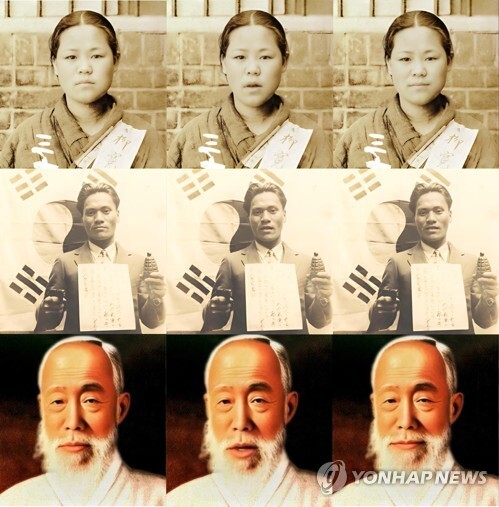 |
| ▲ This photo, provided by ESTsoft Co., shows the images of three late Korean independence fighters -- Yu Gwan-sun, Yun Bong-gil and Namgung Eok (from top to bottom) -- which the company recreated with its artificial intelligence technology for a KBS-TV special documentary on the occasion of the 78th anniversary of Liberation Day from Japanese colonial rule of Korea (1910-45) on Aug. 15, 2023. (PHOTO NOT FOR SALE) (Yonhap) |
SEOUL, Aug. 15 (Yonhap) -- August 15th, the National Liberation Day of Korea, holds profound significance in South Korea.
Known as Gwangbokjeol, or "Restoration of Light," it marks the day in 1945 when Korea was liberated from 35 years of Japanese colonial rule. Gwangbokjeol is not only a reminder of the nation's hard-won independence but also a time for reflecting on Korea's journey towards freedom, democracy, and prosperity.
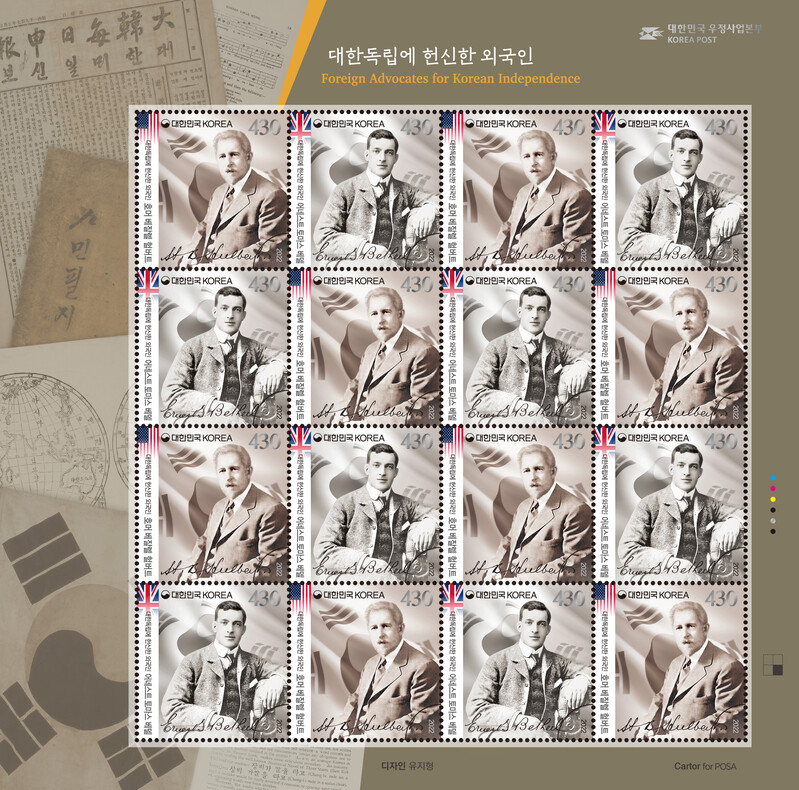 |
| ▲ This photo, provided by Korea Post, shows stamps featuring foreigners who contributed to Korea's independence from Japan's colonial rule (1910-1945), issued on Aug. 12, 2022, three days ahead of Liberation Day. (PHOTO NOT FOR SALE) (Yonhap) |
Over the decades, the methods and significance of commemorating this day have evolved, reflecting the changing socio-political landscape of Korea. Today, Koreans engage in a wide range of activities that honor their past while also looking toward the future, ensuring that the spirit of liberation continues to resonate with each generation.
One of the most prominent aspects of present-day efforts to commemorate National Liberation Day is the official ceremonies held by the South Korean government. Every year, a grand ceremony takes place at the Independence Hall of Korea in Cheonan or other significant venues, attended by government officials, including the President, war veterans, and citizens. These ceremonies often feature speeches that reflect on the sacrifices made by independence activists, emphasize national unity, and highlight the country’s progress.
The President’s address is particularly important as it often touches upon current national issues, drawing parallels between the struggles of the past and the challenges of the present. In recent years, these speeches have increasingly focused on the importance of peace on the Korean Peninsula, particularly in the context of inter-Korean relations and ongoing efforts towards reunification.
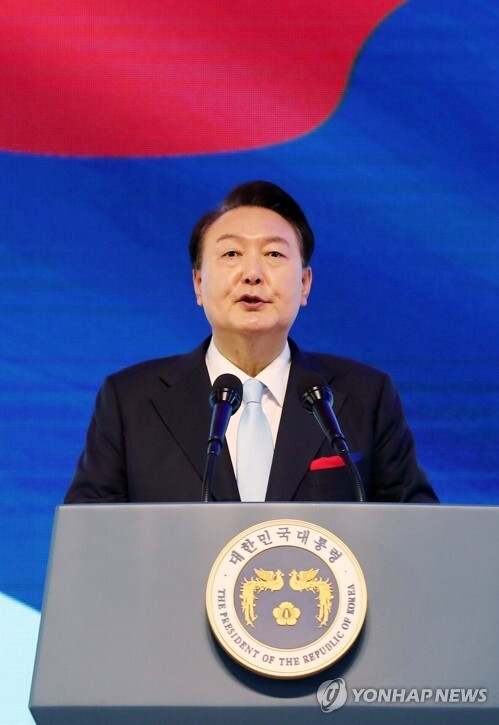 |
| ▲ President Yoon Suk Yeol delivers a speech at an event to mark the 78th anniversary of Liberation Day on Aug. 15, 2023. (Pool photo) (Yonhap) |
In addition to official ceremonies, educational initiatives play a crucial role in commemorating Gwangbokjeol. Schools across South Korea incorporate lessons about the historical significance of the day into their curriculum, ensuring that young people understand the sacrifices made by their ancestors. These lessons often include stories of key figures in the independence movement, such as Ahn Jung-geun, Kim Gu, and Yu Gwan-sun, as well as discussions about the broader context of Korea's colonial experience.
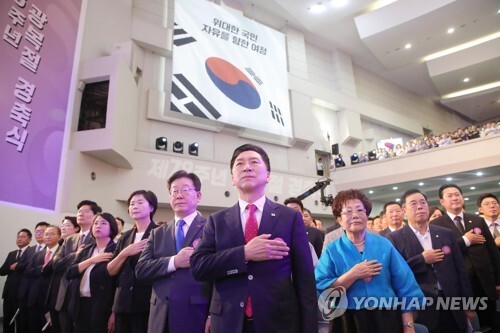 |
| ▲ Leaders of rival parties attend a ceremony marking the 78th anniversary of Liberation Day in Seoul on Aug. 15, 2023. (Pool photo) (Yonhap) |
Various educational programs and exhibitions are organized by museums and cultural institutions, providing more opportunities for the public to engage with this history. For example, the Independence Hall of Korea regularly hosts special exhibitions that delve into different aspects of the liberation struggle, using historical documents, artifacts, and interactive displays to bring history to life.
Public participation in commemorative activities has also seen a resurgence in recent years, fueled by a growing sense of national pride and interest in Korea's history. On August 15th, it is common to see the national flag, the Taegeukgi, displayed prominently on buildings and homes, a tradition that symbolizes national unity and pride.
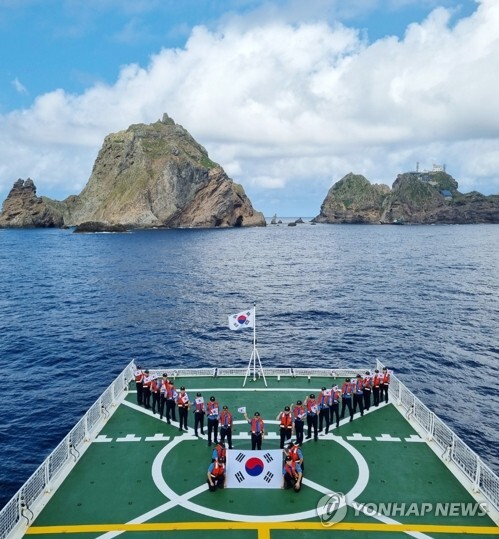 |
| ▲ Coast guards pose for a photo while unfurling the national flag on their ship in the seas near South Korea's easternmost Dokdo islets on Aug. 12, 2023, three days ahead of Liberation Day marking Korea's independence from Japanese colonial rule (1910-45), in this photo provided by the Korea Coast Guard. (PHOTO NOT FOR SALE) |
In many cities, local communities organize parades, reenactments, and cultural performances that celebrate the country's heritage. These events not only serve as a reminder of the past but also create a festive atmosphere where people of all ages can come together to express their love for their country.
On Gwangbokjeol, many Koreans take the opportunity to visit historical sites related to the independence movement, such as Seodaemun Prison in Seoul, where many activists were imprisoned and tortured. These visits are often deeply emotional experiences, fostering a deeper connection with the struggles of the past.
The digital age has also transformed the way National Liberation Day is commemorated. Social media platforms are flooded with posts celebrating the day, with hashtags like #Gwangbokjeol and #DaehanDongnipManse trending nationwide. These platforms provide a space for individuals to share personal reflections, historical facts, and expressions of patriotism.
 |
| ▲ This photo shows T-shirts, released by Eland Group's SPAO on Aug. 13, 2021, to mark the 76th anniversary of the Aug. 15 Liberation Day. (Yonhap) |
 |
| ▲ This photo, captured from YouTube on Aug. 10, 2021, shows Pengsu, a popular penguin character, visiting South Korea's eastern most Dokdo Islets, ahead of the 76th anniversary of Liberation Day on Aug. 15. Pengsu is a sensation on the YouTube channel Giant Peng TV, run by South Korea's Educational Broadcasting System. (PHOTO NOT FOR SALE) (Yonhap) |
Online campaigns and virtual events have become more common, especially in the wake of the COVID-19 pandemic. For instance, virtual tours of historical sites, online lectures, and webinars have allowed people to participate in commemorative activities from the comfort of their homes. These digital efforts not only increase accessibility but also help to engage younger generations who are more attuned to online spaces.
While Gwangbokjeol is primarily a day of celebration, it also serves as a time for contemplation and dialogue about Korea's ongoing challenges. Issues related to Japan-Korea relations, such as disputes over wartime reparations and historical memory, often resurface during this time, reminding the public that the legacy of the colonial period continues to affect the present.
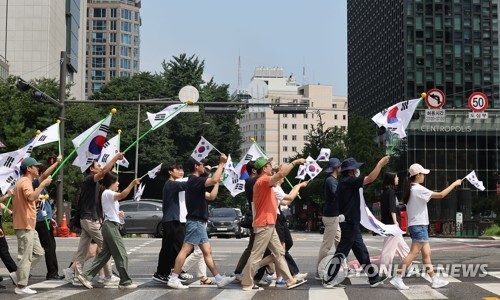 |
| ▲ People march on a street in central Seoul holding the Taegeukgi, South Korea's national flag, celebrating the 78th anniversary of Liberation Day on Aug. 15, 2023. (Yonhap) |
Activists and civic groups frequently use this day to call for justice and reconciliation, emphasizing the need for a truthful and complete historical reckoning. This aspect of the commemoration reflects a broader societal desire to address the unresolved issues of the past, not only for the sake of justice but also to pave the way for a more peaceful and cooperative future.
The commemoration of Gwangbokjeol in present-day Korea is a multifaceted event that combines official ceremonies, educational initiatives, public participation, and digital engagement. It is a day that honors the past while also encouraging reflection on the present and future.
As Korea continues to navigate its complex history and evolving identity, Gwangbokjeol remains a vital occasion for fostering national unity, preserving historical memory, and inspiring future generations to uphold the values of freedom and independence.
Through these ongoing efforts, Koreans ensure that the light of liberation continues to shine brightly for years to come.
(C) Yonhap News Agency. All Rights Reserved






















![[인사] 영화진흥위원회](/img/k-vibe-logo.jpg)
